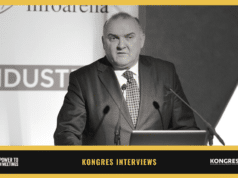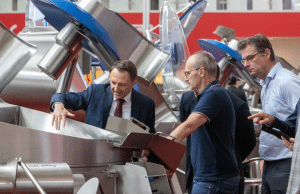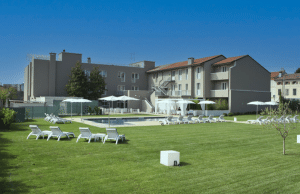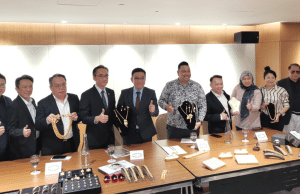The coronavirus pandemic has been revoked, but it would be naive to think everything will simply fall back into place like it never happened. Many industries will keep feeling the effects for some time and one of the most affected is surely the meetings industry. A group of industry experts formed an initiative committee to share their thoughts and concerns with the government and try to persuade the competent authorities to help keep the meetings industry on its feet.
We asked members of the initiative committee for the preservation of the Slovenian meetings industry for their thoughts on the current situation, post-COVID-19 times and governmental help.
mag. PETRA STUŠEK, Managing Director at Ljubljana Tourism
Q: What is your official position on the measures taken so far by the Slovenian Government to help the Slovenian meetings industry?
It is moving in the desired direction. We would like it to be faster, but the recognition of the meetings industry as a united sector of contractors from different industries is an important step towards development. The next step is to achieve a general understanding of the positive multiplier effects that this industry triggers through its operations, even for many who are not professionally involved in tourism.
THE SITUATION IS EXTREMELY WORRYING, AS WE ARE ALL AWARE THAT WE MUST SURVIVE THE TRANSITIONAL PERIOD
Q: What will be the revenue drop in your company compared to 2019? How many events did you have to postpone or cancel?
Tourism in Ljubljana, as an important industry, is extremely dependent on foreign guests, as they generate as much as 96 % of all overnight stays. If we talk about the wider impact on the destination, we can observe a very high income gap among all the stakeholders in the meetings industry (hotels, special venues, specialized meeting agencies, event agencies, catering, etc.). According to some estimates, this period will last until the spring of 2021. The situation is extremely worrying, as we are all aware that we must survive the transition period until business is – as much as possible – normalized again. This applies to each stakeholder individually and to the industry as a whole.
In March, we recorded over 30 business events and scientific professional meetings of international associations in Ljubljana, which should take place by the end of this year, with expected participation of between 100 and 2.000 participants. According to currently available data, three events took place entirely virtually, some smaller events in the second half of the year remain confirmed, and all major meetings and congresses have been postponed to 2021/2022. The annual turnover of the Ljubljana meetings industry amounts to as much as 60 % of the entire Slovenian meetings industry in normal circumstances, approximately 162 million euro. The loss this year could amount to a catastrophic 139 million euro.
wE EXPECT SMALLER, MORE REGIONALLY ORIENTED EVENTS
Q: The government is slowly releasing restrictions. Do you think the situation in this area is slowly normalizing itself?
The first hotels with less than 30 rooms started opening on 18 May, and more have been opening every week since. Currently, there are more than 1.000 rooms available in Ljubljana, with a 40 % occupancy rate. If we look at the total occupancy of all the capacities available in the city (including those not yet available), then this share is smaller, amounting to 12 %. The situation is improving which makes us immensely happy, but the unpredictable situation is, of course, a completely new reality, to which we will have to get accustomed to. We are very concerned about the unclear situation regarding the opening of the borders and quarantine, which is changing unpredictably, and it is currently not possible to predict whether the growth trend of overnight stays will continue, stop, or even decrease.
We are preparing for the autumn, which is usually very dynamic for the congress segment. We expect smaller, and in terms of participation, more regionally oriented events, of course, in case the epidemiological picture in the country stays stable. We are in regular contact with the partners of Ljubljana congress tourism, with whom we are coordinating new dates of events and details of the organization of postponed conferences. With a good overview of upcoming events and their optimal distribution, we will be able to coordinate the state of occupancy at the destination in the coming months.
Q: What does the current situation mean for event planning? What would make your business much easier in this regard?
A clear strategy on the opening of borders and establishing air transport and connections is of paramount importance. We expect certain events to be smaller in the future, we can expect more regional meetings. There is a big decline in the segment in which Ljubljana has positioned itself well in recent years, i.e. European and international congresses and events. We are adapting to all these novelties.
Above all, all stakeholders in congress tourism in Ljubljana and Slovenia must effectively contribute to restoring confidence in safe travel and stay in our destination and confidence in the maximum measures for the safe return of foreign delegates to their home countries. In this way, the capital will once again be able to host important experts from various fields, prestigious international events and scientific conferences, which are the driving force behind the further development of Slovenian science and economy while strengthening Ljubljana’s reputation and promoting it as a quality congress destination.
Q: During the crisis, we found that events could also be organized remotely. What is your position on this?
In recent months, the company has digitalized overnight. The technology enables a range of virtual events to all age groups and professions, which is very positive. I expect that (perhaps temporarily) we will have more of so-called hybrid events; the delegates from further away countries will be able to attend meetings remotely. From a sustainable point of view and the impact on the environment, this is great news, but at the same time, it means a shift in thinking, a completely new way of working and doing business. Certainly, some of the events will remain hybrid, and people as a social species will probably eventually start going back to the form we prefer – meeting and making live contact. According to our data, this is also the opinion of colleagues from the meetings industry in Europe and around the world.
DIGITALIZATION IN TOURISM IS BECOMING A KEY TREND OF THE FUTURE
Q: What are your crisis exit strategies? Are you preparing any innovations?
We focused on acquiring local and regional events and strengthening the brand of Ljubljana as a destination in Slovenia and in the surrounding countries we have open borders with. In terms of content, this means adapting our products to smaller groups or individuals, taking into account the rules set by the National Institute of Public Health. We are also strengthening our digital appearance; digitalization in tourism, in general, is becoming a key trend of the future, and after the epidemic, this is even more pronounced.
Q: The initiative to preserve the Slovenian meetings industry was signed by almost 700 individuals. How do you evaluate the initiative and could it lead to a new formal movement or integration?
We welcome any initiative aimed at improving the situation. However, I am pleased that certain initiatives – such as this one – are also yielding concrete results. We know that a crisis is always a time of opportunity, and I am extremely pleased that the local congress community has come together so quickly and uniformly. Our integration allows all actors to strengthen their understanding of the added value of this segment, which is still (too) often misunderstood – especially in terms of the positive multiplier effects it brings to the domestic economy and development. The initiative has brought new collaborations, new reflections on the challenges of the industry, so I expect that this integration will be carried into the future and will maintain its momentum.
Q: What did the forced break mean for you personally? Has it given you a glimpse into the meetings industry from a distance? What is your view?
Personally, I did not have a break because, among other things, I actively participated in the various initiative committees active throughout the crisis. However, contrary to normal circumstances, I didn’t look at the meetings industry from a distance, but from the very core. I experienced the effective merging of different industries under one roof, and from this initiative committee, not only new connections but also new acquaintances, important for our future cooperation, were born. Thus, I return to the importance of making and maintaining personal relationships.
Q: Tell us why the Slovenian government must urgently support the Slovenian meetings industry.
The meetings industry is a highly complex system that includes many industries and business segments and connects professionals in a wide variety of fields. According to some estimates, the industry includes 15.000 individuals in Slovenia, and an additional 20.000 are indirectly included, mainly from the so-called creative industry. The annual turnover of the Slovenian meetings industry amounts to 270 million EUR, taking into account the multiplier effect, so the drop this year will be as much as 891 million EUR. A successful restart of this segment could thus trigger a positive wave of the revival of a series of different industries, which would have a very beneficial effect on the domestic economy in the process of recovery.
We also mustn’t forget that the consumption of congress guests is high, as evidenced by European research, and it has proven similar in our country. The three-year average results of the Ljubljana Tourism survey show that delegates of international congresses and other types of business meetings in Ljubljana on average spend three times more per day than leisure tourists.
All this should convince our government!














